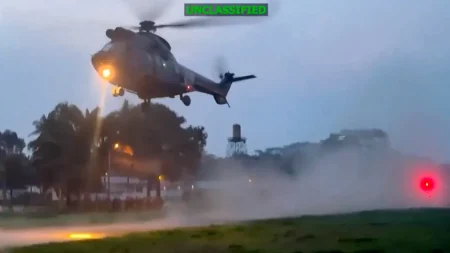Ukraine’s Military Renaissance: Building Deterrence Through Self-Reliance
The New Doctrine of Deterrence: Why Ukraine Believes Weapons Trump Promises
In the shadow of ongoing conflict, Ukraine has fundamentally reshaped its national security doctrine around a sobering premise: a well-armed Ukrainian military provides more credible deterrence against Russian aggression than any security guarantees from Western allies. This strategic pivot represents a profound evolution in Kyiv’s thinking, born from harsh lessons on the battlefield and the complex geopolitical realities that have defined Eastern Europe’s security landscape since 2014. Senior defense officials in Kyiv, speaking on condition of anonymity due to the sensitivity of defense strategy, have increasingly emphasized that while diplomatic support from NATO and European partners remains invaluable, the ultimate guarantee of Ukraine’s sovereignty rests in its capacity to inflict prohibitive costs on any future Russian military adventures.
“We appreciate every commitment made by our international partners, but the reality is stark – only Ukrainian soldiers with Ukrainian weapons stand between Russian forces and Kyiv,” noted a high-ranking security advisor to President Volodymyr Zelenskyy during a recent strategic assessment briefing. This sentiment reflects Ukraine’s pragmatic recognition that despite unprecedented Western backing, the nation must ultimately take primary responsibility for its defense capabilities. The approach marks a distinct shift from earlier diplomatic strategies that more heavily emphasized Ukraine’s integration into Western security frameworks as the primary deterrent against Moscow. Now, Ukrainian leadership is pursuing a two-track approach: maintaining diplomatic pressure for eventual NATO membership while simultaneously building a military force powerful enough to make any Russian aggression prohibitively expensive – regardless of formal alliance structures.
Financial Innovation: Ukraine’s Ambitious Plans to Fund Military Modernization
Ukraine’s defense ministry has launched what analysts describe as one of the most ambitious military procurement initiatives in recent European history, aiming to attract billions in international investment specifically earmarked for weapons acquisition and defense industrial development. The cornerstone of this strategy is the recently established Defense Procurement Fund, designed to provide transparent mechanisms through which international partners can contribute directly to Ukraine’s weapons purchases while maintaining appropriate oversight. Economic advisors to the Ukrainian government have crafted innovative financing instruments that allow for public-private partnerships in defense production, enabling international defense contractors to establish joint ventures with Ukrainian firms under favorable terms.
Defense Minister Rustem Umerov has been conducting an intensive diplomatic campaign across European capitals and Washington, presenting detailed procurement plans that prioritize advanced air defense systems, counter-battery radar, electronic warfare capabilities, and unmanned systems. “We’re not simply asking for donations – we’re offering strategic partnership opportunities with clearly defined objectives and accountability mechanisms,” Umerov explained during a recent presentation to potential international investors in Brussels. The ministry has established a dedicated investment liaison office staffed by professionals with backgrounds in international finance and defense procurement, many recruited from the Ukrainian diaspora in North America and Western Europe. These efforts have already shown promising results, with several European defense manufacturers entering preliminary agreements to establish production facilities within Ukraine, potentially transforming the country from an arms recipient to a regional defense production hub over the coming decade.
Domestic Defense Innovation: Ukraine’s Growing Military-Industrial Complex
The transformation of Ukraine’s defense industrial base represents one of the most remarkable aspects of the country’s military renaissance. Once heavily dependent on Soviet-era equipment and Russian supply chains, Ukraine has rapidly developed indigenous capabilities in several critical defense sectors. This evolution began as necessity following the 2014 annexation of Crimea but has accelerated dramatically since 2022. Ukrainian defense firms have demonstrated remarkable innovation, particularly in unmanned systems, electronic warfare, and battlefield management software – areas where agility and technological creativity offer advantages over Russia’s more conventional military-industrial approach.
The Kyiv Polytechnic Institute has established a Defense Technology Innovation Hub that brings together academic researchers, private sector engineers, and military specialists to develop solutions for immediate battlefield challenges. This collaborative model has already produced several breakthrough technologies, including advanced drone detection systems and countermeasures against Russian electronic warfare capabilities. “What makes the Ukrainian approach unique is the speed of the feedback loop between frontline units and our development teams,” explained Professor Oleksandr Danylyuk, who heads the institute’s robotics division. “When soldiers identify a capability gap or a Russian advantage, we can prototype solutions within weeks rather than the years typical in traditional defense procurement cycles.” This nimble approach to defense innovation has attracted attention from Western defense firms, with several major European and American companies establishing research partnerships with Ukrainian institutions to leverage this battlefield-tested expertise.
Diplomatic Strategy: Balancing Independence with Alliance Building
Ukraine’s emphasis on military self-reliance does not signal diplomatic isolation – rather, it represents a sophisticated balancing act between maintaining strong international partnerships while reducing existential dependence on any single ally or alliance. Ukrainian diplomats have crafted a nuanced approach that acknowledges the crucial importance of Western support while simultaneously emphasizing Ukraine’s agency in determining its own security architecture. This approach allows Kyiv to maintain constructive relationships with partners who may have divergent views on the optimal resolution of the conflict while preserving Ukraine’s sovereignty in strategic decision-making.
Foreign Minister Dmytro Kuleba has been instrumental in articulating this position across international forums, emphasizing that Ukraine’s military strengthening should be viewed as complementary to, rather than competitive with, broader European security arrangements. “A strong Ukraine creates a stronger Europe,” Kuleba stated during recent consultations with NATO officials in Brussels. “Every capability we develop relieves pressure on the Alliance’s eastern flank and contributes to collective deterrence.” This framing has proven effective in maintaining broad international support while allowing Ukraine to pursue its distinct security vision. The strategy reflects a clear-eyed assessment that while formal security guarantees remain important diplomatic objectives, they cannot substitute for tangible military capabilities in the immediate term. Ukrainian diplomatic representatives have become increasingly adept at translating this strategic vision into language that resonates with different international audiences, whether addressing security concerns in Baltic states, economic interests in Western Europe, or strategic competition perspectives in Washington.
The Road Ahead: Challenges and Opportunities in Ukraine’s Security Evolution
Despite remarkable progress in military modernization and strategic adaptation, Ukraine faces significant challenges in sustaining its security transformation. The economic burden of maintaining high defense spending amid wartime conditions creates inevitable tensions with other national priorities, including reconstruction efforts and social welfare programs. Additionally, the demographic impact of the conflict poses long-term challenges for military recruitment and retention, potentially constraining Ukraine’s ability to maintain force levels necessary for comprehensive territorial defense without technological force multipliers. Defense planners in Kyiv are actively addressing these challenges through initiatives focused on maximizing combat effectiveness per soldier through superior training, equipment, and tactical innovation rather than competing with Russia in terms of raw numbers.
Looking ahead, Ukraine’s strategic approach offers both a model and a warning for other nations facing asymmetric security threats from larger neighbors. The Ukrainian experience demonstrates that meaningful deterrence requires more than diplomatic arrangements or security guarantees – it demands concrete military capabilities specifically tailored to counter an adversary’s operational advantages. As one senior Ukrainian defense official summarized: “The most effective peace negotiation tool is a military that makes aggression unaffordable.” For European security architecture broadly, Ukraine’s evolution suggests a potential future where regional security relies not just on formal alliance structures but on networks of militarily capable states with complementary capabilities and shared security interests. Whether this model represents the future of European security or simply Ukraine’s necessary adaptation to uniquely challenging circumstances remains one of the most consequential questions facing the continent’s strategic thinkers. What remains clear is that Ukraine’s pursuit of military self-sufficiency has fundamentally altered the strategic calculus in Eastern Europe in ways that will influence security planning far beyond the current conflict.









